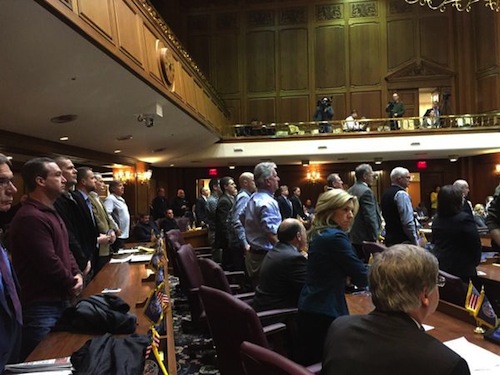An Indiana law that leveled the playing field for building and construction workers on public projects for 80 years is on the verge of repeal by the state’s Republican-led legislature.
Ironically, Indiana’s Common Construction Wage Law was first established in 1935 as a Republican initiative, a response to out-of-state contractors undercutting Indiana firms with cheaper, less-skilled labor on public projects.
Under the statute, a five-person committee comprised of taxpayers, industry experts and public agency representatives determines wages to be paid on public construction projects.
Projects like the Indianapolis International Airport and Lucas Oil Stadium, home to the Indianapolis Colts, have been constructed under the common wage.
“Today we’re paying a price for losing too many labor-friendly legislators in 2010 and even more in 2012,” says Indiana Political Coordinator Mike Daugherty. “Too many union members across the state failed to show up and vote their interests.”
For the past 10 years, Gov. Mike Pence and his predecessor, Mitch Daniels, have consistently spread the notion that letting construction wages fluctuate on the free market will save taxpayers money, Daugherty said.
On Feb. 23, the Indiana House of Representatives voted to repeal the common construction wage.
On March 1, the Indiana state Senate’s president snatched the bill repealing the common wage out of the hands of the chamber’s pension and labor committee. His action undermined his Republican ally, the labor committee’s chairman, who had called for a summer study committee to review the proposed legislation prior to any senate vote.
 |
| IBEW members and members of other building trades attend hearings on the proposed repeal of an 80-year-old law that determines wages on public construction projects. |
The Senate, says Daugherty, is now poised to kill the bill before the current session of the part-time legislature adjourns for the summer. Only 10 of 50 state senators and 29 of 100 lower chamber members consistently support worker-friendly legislation, he says.
“Big business is having their way,” says Kokomo, Ind., Local 873 Business Manager Chuck Griffin, who says anti-union contractors and their friends in public office have weakened the common construction wage step-by-step since 1995.
In 2012, the threshold for applicability of the common wage was raised from $150,000 to $350,000, reducing the number of workers it protected. And the composition of the five-person committee was changed to include an overtly anti-union entity.
In addition to an industry representative appointed by the awarding agency and an Indiana AFL-CIO representative, the committee had consisted of an appointee of the governor. The 2012 change provided for the governor’s appointment to be transferred to the vehemently anti-union Associated Builders and Contractors.
To defend the common construction wage, the IBEW, Indiana’s building and construction trades and their signatory contractors produced dozens of fact sheets for state residents and the mass media explaining how the wage builds strong communities, local shops and businesses and apprenticeship opportunities for youth and unemployed adults.
Testifying in support of the common wage in the Indiana House, Michelle Boyd, executive director of the Indiana Building Contractors Alliance, told legislators, “Indiana has a strong construction industry business base representing both small and large businesses. Together, these businesses invest more than $42 million a year in apprenticeship training throughout the state of Indiana.”
Legislators opposing repeal include a bi-partisan House delegation from heavily industrial Northwest Indiana. They counter the governor’s claim that terminating the common construction wage would save taxpayers money.
“When you’re dealing with taxpayers’ money, you have to make sure the job gets done right and you’ve got quality workers doing that work,” said Northwest Indiana State Sen. Rick Niemeyer. “Until somebody can show that eliminating this law is going to help that, I can’t support it,” the Republican told the Northwest Indiana Times.
While opponents expect the common construction wage to be repealed, some municipal public officials are pushing back. In South Bend, the city voted to continue paying prevailing wages no matter what the legislature decides.
Despite pockets of resistance, Daugherty expects an ongoing docket of anti-worker legislation as Pence and his party’s legislators continue to advance the anti-worker agenda of ALEC, the American Legislative Exchange, supported by big money businessmen like the Koch brothers.
Says International President Edwin D. Hill:
Repeal of the common construction wage would be another tragedy for workers in a state where workers have already seen too much pain as its industrial base has declined. Our adversaries in Indiana will continue to spread the false notion that cheaper construction is better for taxpayers. We must spare no effort to continually demonstrate to our neighbors how local communities benefit from the superior training, purchasing power and dependability of IBEW members and other proud workers in the building and construction trades.